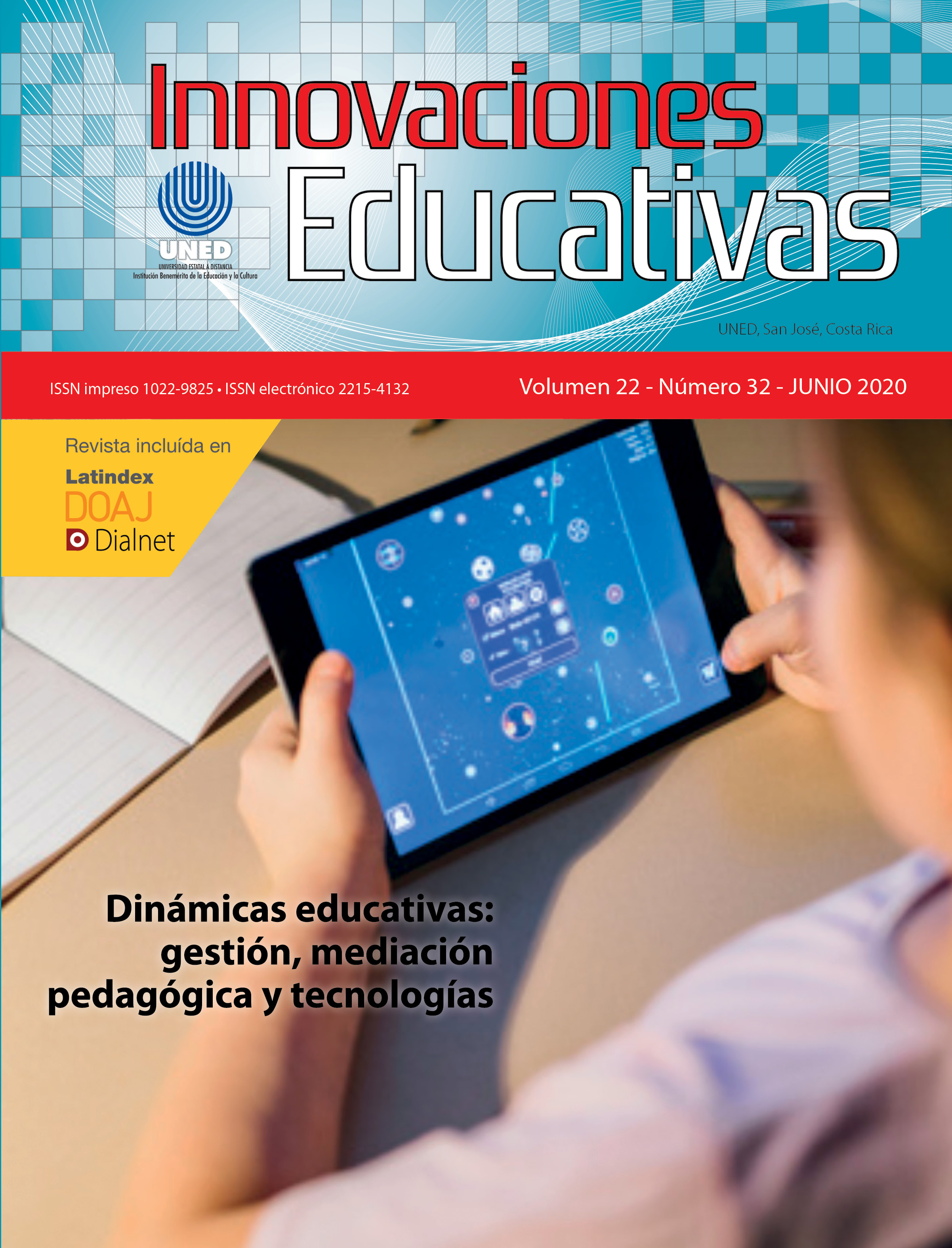Lesson design and development using the Costa Rican Mathematics curriculum
DOI:
https://doi.org/10.22458/ie.v22i32.2767Keywords:
Teaching Mathematics, Secondary education (1st level), Geometry, Reasoning, Educational reform, Problem solvingAbstract
Problem solving has been incorporated in different ways into the curricula of various countries. In Costa Rica, it is placed as the main focus of the national curriculum with a methodological character that guides classroom action and structures the lesson. The article describes the design of two mathematical tasks formulated in a geometric problem the educational purpose of which is the introduction of the concept of bisector and its associated property. An analysis of the activation of mathematical processes is carried out for each task to then counter them with the evidence collected when applying the problem to a group of first year of secondary education of the Professional Technical High-School of Pacayas, Cartago, Costa Rica. Also, a global balance is made of how the lesson develops to assess if the problem posed fulfilled the previously established educational purposes. The conclusion is that the study offers the educational community a successful experience in the design and execution of a lesson framed in the problem-solving approach for learning new knowledge, in accordance with the study programs of the Ministry of Public Education of Costa Rica. MEP (2012).
References
Blanco, A., Martínez, B. y Jiménez, M. (2018). ¿Puede la investigación iluminar el cambio educativo? Ápice. Revista de Educación Científica, 2(2), 15-28. DOI: https://doi.org/10.17979/arec.2018.2.2.4612
Bransford, J. y Stein, B. (1987). Solución IDEAL de Problemas. Barcelona, España. Ed. Labor.
Cerrón, W. (2019). La investigación cualitativa en educación. Horizonte de la Ciencia, 9(17). DOI:10.26490/uncp.horizonteciencia.2019.17.510
Díaz, J. y Díaz, R. (abril, 2018). Los Métodos de Resolución de Problemas y el Desarrollo del Pensamiento Matemático. Bolema, 32 (60), 57-74. Recuperado de https://doi.org/10.1590/1980-4415v32n60a03
Gil, J., León, J. y Morales, M. (2017). Los paradigmas de investigación educativa, desde una perspectiva crítica. Revista Conrado, 13(58), 72-74. Recuperado de https://conrado.ucf.edu.cu/index.php/conrado/article/view/476/510
Guzmán, M. (1991). Para pensar mejor. Barcelona, España. Ed. Labor.
Hernández, L. y López, E. (2015). Modelos de planeamiento didáctico y plan de lección empleando la Integración de habilidades Matemáticas para la Educación Secundaria. Cuadernos de Investigación y formación en educación matemática, 13, 289-299. Recuperado de http://revistas.ucr.ac.cr/index.php/cifem/article/view/19163/19218
Isoda, M. y Olfos, R. (2009). El enfoque de resolución de problemas. Ediciones universitarias de Valparaíso. Valparaíso, Chile.
Isoda, M. y Katagiri, S. (2016). Pensamiento matemático: Cómo desarrollarlo en la sala de clases. Centro de Investigación Avanzada en Educación, Universidad de Chile. Chile.
Isoda, M., Arcavi, A. y Mena, A. (2012). El estudio de clases japonés en Matemáticas. Ediciones universitarias de Valparaíso. Valparaíso, Chile.
Mason, J. Burton, K. y Stacey, K. (1982). Pensar Matemáticamente. Barcelona, España. Ed. Labor.
Mazzilli, D., Hernández, L. y De La Hoz S. (2016). Procedimiento para Desarrollar la Competencia Matemática Resolución de Problemas. Escenarios, 14 (2), 103-119 DOI: http://dx.doi.org/10.15665/esc.v14i2.935
Meza, L. Agüero, E. y Suarez, Z. (agosto, 2019). Reforma de la educación matemática en Costa Rica: evaluación de avance de la implementación en la educación secundaria. Matemática, Educación e Internet. 19(2). ISSN 1659 -0643. Recuperado de https://tecdigital.tec.ac.cr/revistamatematica/ARTICULOS_V19_N2_2019/RevistaDigital_MezaAgueroSuarez_V19_n2_2019/RevistaDigital_MezaAgueroSuarez_V19_n2_2019.pdf
Ministerio de Educación Pública (MEP) (2012). Programas de Estudio de Matemáticas. I, II Y III Ciclos de la Educación General Básica y Ciclo Diversificado. San José: Autor.
Perines, H. (2018). ¿Por qué la investigación educativa no impacta en la práctica docente? Estudios sobre educación, 34, 9-27. Recuperado de https://doi.org/10.15581/004.34.9-27
Polya, G. (1945). How to solve it. A new aspect of mathematical method. Princeton University Press.
Polya, G. (1979). Cómo plantear y resolver problemas [Obra original publicada en 1945]. México: Trillas.
Programa Estado de la Nación. (2015). Estado de la educación costarricense. San José, Costa Rica: Editorial ED S.A.
Ruiz, A. (2018). Evaluación y pruebas nacionales para un currículo de Matemáticas que enfatiza capacidades superiores. México: Comité Interamericano de Educación Matemática CIAEM. ISBN 978-607-97480-3-6
Schoenfeld, A. (1985). Mathematical Problem Solving. New York: Academic Press.
Sriraman B. (2004). Reflective abstraction, uniframes and the formulation of generalizations. Journal of Mathematical Behavior, 23, 205-222.
Vargas, Z. (2009). La investigación aplicada: una forma de conocerlas realidades con evidencia científica. Revista Educación, 33(1), 155-165.
Villegas, J. L., Castro, E., y Gutiérrez, J. (2009). Representaciones en resolución de problemas: un estudio de caso con problemas de optimización. Electronic Journal of Research in Educational Psychology, 7(17), 279-308. Recuperado de http://www.investigacionpsicopedagogica.org/revista/articulos/17/espannol/Art_17_297.pdf
Vogel R. (2005). Patterns: A fundamental idea of mathematical thinking and learning. ZDM International Journal on Mathematics Education, 37(5), 445-449.
Yerushalmy, M. (2000). Problem solving strategies and mathematical resources: a longitudinal view on problem solving in a function based approach to algebra. Educational Studies in Mathematics, 43(2), 125-147, doi: 10.1023/A:1017566031373
Yimer, A. y Ellerton, N. (2010). A five-phase model for mathematical problem solving: Identifying synergies in pre-service teachers' metacognitive and cognitive actions. ZDM The International Journal on Mathematics Education, 2(42), 245-261, doi: 10.1007/s11858-009-0223-3
Zumbado, M., Oviedo, D. y Vargas, G. (2015). Integración de habilidades matemáticas en el plan de lección y el planeamiento del periodo, modelo para la Educación Primaria. Cuadernos de Investigación y formación en educación matemática, 13, 275-287. Recuperado de http://revistas.ucr.ac.cr/index.php/cifem/article/view/19162/19220

